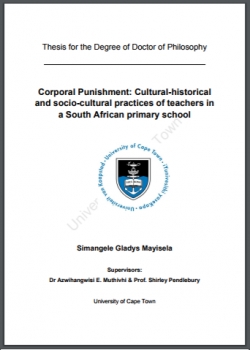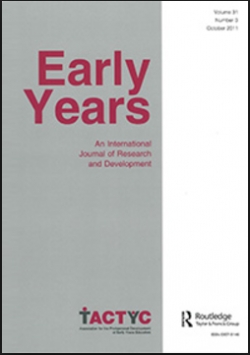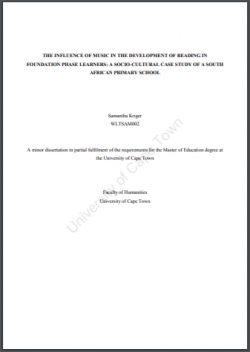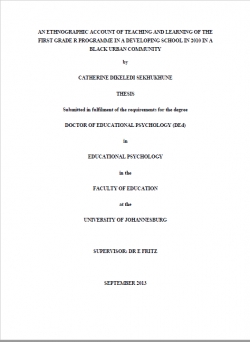Tools for learning : a socio-cultural analysis of pedagogy in early reading competency
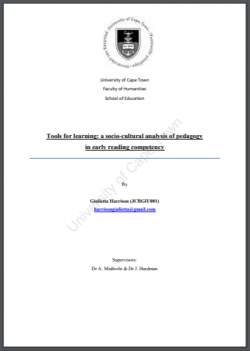
Type
Thesis
Authors
Category
ECCE, Foundation
[ Browse Items ]
Publication Year
2014
Publisher
University of Cape Town, School of Education, Cape Town, South Africa
URL
[ private ]
Pages
314 p.
Subject
Early childhood education, Primary education, Foundation Phase, Grade 1, Learners, Educators, Learning to Read, Pedagogy, Cultural influence, South Africa
Tags
Abstract
This research aimed to understand how children learn to read and how best to facilitate early reading competencies. It examined pedagogic styles through a socio-cultural lens with a view to describing what currently yields results in South African Grade One classrooms. The participants were Grade One educators in both former Model C 1 schools and less privileged schools. This multiple case-study comprised a research demographic of 126 learners, 14 teachers and five schools. Use was made of a basal reading test, comprehension test, problem-solving test, film observations of teachers giving lessons, and teacher interviews. A coding schedule was designed to facilitate the analysis of pedagogic modes as observed in the film footage. The pedagogic modes were determined from a pilot study and the use of a Vygotskian framework. Ten modes were identified: use of existing knowledge, practising a concept, collaborative learning, conscious mediation, use of the ZPD, scaffolded learning, rote learning, worksheet-based learning, ability-group teaching and didactic teaching. The first six modes are Vygotskian in nature, of which the first four were the most frequently used. Qualitative analysis of teacher interviews, together with a quantitative analysis of pedagogic modes, permitted comparison of what teachers said with what they did in their classrooms. A stratified sample of nine learners per teacher evidenced a significant improvement between the pre- and post-tests of literacy. Cross-analysis of learner test results with pedagogic modes showed that collaborative learning was an effective tool for mediation. This research showed that use of Vygotskian principles was not fully developed. Some of the challenges faced in South African classrooms were revealed. Despite these challenges, learners did progress, even in underprivileged circumstances. A central message that emerged is that learners’ individual strengths and weaknesses are not adequately identified or catered for in Grade One classrooms, and their teachers need support in acquiring the skills to do so.
Description
Thesis (PhD)--University of Cape Town, 2014
Number of Copies
1
| Library | Accession No | Call No | Copy No | Edition | Location | Availability |
|---|---|---|---|---|---|---|
| Main | 809 | 1 | Yes |
